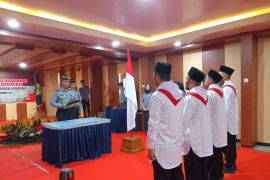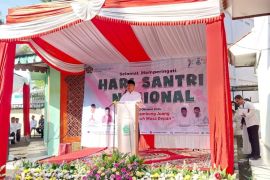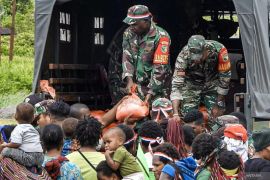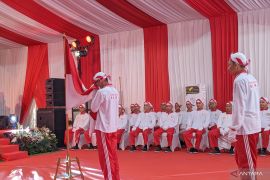President Jokowi's administration has set development in Papua as a priority. This commitment is followed up by accelerating infrastructure development for transportation not only land transportation but also sea and air transportation.
The government also targets that in 2018 all regencies in Papua are connected by a land route. Besides, the government also concerns about wealth and economic improvement to promote investment in Papua. The government will establish a sago processing factory in South Sorong, West Papua and followed by an establishment of cement factory with 1 million tons per year capacitythat becomes joint project of State-Owned Enterprises (BUMN) and PT. Semen Indonesia Tbk involving Local-Owned Enterprises (BUMD).
In order to support the plans, the government has budgeted Rp 3.8 trillion to develop transportation infrastructure and build national activities centers in Sorong, Jayapura, and Timika, also some strategic activities centers in Manokwari, Raja Ampat, and Tanah Merah. Moreover, the government also opens the access to all media to cover and broadcast about Papua to show the commitment of transparency and the freedom in Papua. All this time there are so many propaganda saying that there is no freedom in Papua and Indonesian government always takes repressive measures to stop people in expressing themselves. These policies are hoped to be able to bring Papua to be more developed and wealthier like what all Papuans wish for.
Unfortunately, amidst the efforts of Jokowi's administration together with Papuan society and all stakeholders to accelerate the development in Papua, there appear some small groups of people who campaign for referendum and deny the history of Papuan figures who together with other Indonesians had struggled for the Unitary State of the Republic of Indonesia (NKRI). They claimed that those are the real aspirations of Papuans. Their activities have indeed deterred the progress of development. Those are also, in fact, the opposites of the interest of majority Papuans.
Propaganda of Separatist Movement Disguised as Civil Society
Should we have closer examination to the movement, it was created by a small group of people who then formed an action committee to organize some movements through political and diplomatic path both domestically and abroad. The people in the group was bound by a common goal to draw support so that Papua can separate itself from NKRI.
They try any effort possible to achieve this goal from the moderate one through referendum and political diplomacy to violent one like armed movement. The groups who work in domestic area usually exploit the issue of democracy, freedom, and human rights.
They intensively hold extra parliamentary actions such as rally, demonstration, discussion, seminar, advocacy, propaganda, and opinion building to discredit the government and garner support for a referendum. Their final goal is separation from Indonesia.
Creating propaganda and distortion has become their strategy to discredit Indonesian government. Some issues like human rights abuse, repression towards freedom to gather and getting involved in politic, colonialization by Indonesian Government, and that Papua's integration to NKRI was a form of annexation, are spread to attract sympathyboth from local communities and international communities.
Those groups usually cover themselves as civil society groups that fight for humanity and human rights. In fact, they are merely a group of activists trying to spread hatred towards NKRI both directly and indirectly. These actions can be regarded as a subversive and separatist actions.
Some propaganda, which is actually the opposites of the real wishes of Papuan people, can be seen from some campaigns by Local People Parliamentary (Parlemen Rakyat Daerah/PRD) Merauke chapter on 11 April 2016 in Merauke district, Papua. PRD actively persuades the people of Papua to support United Liberation Movement for West Papua (ULMWP) to become a permanent member of Melanesian Spearhead Group (MSG)as well as supporting the referendum for West Papua.
Both issue will, so called, be discussed on International Parliamentarians for West Papua's (IPWP) meeting in London on 3 May 2016.
Similar actions are done by National Committee of West Papua (Komite Nasional Papua Barat/KNPB) by holding a demonstration on 13 April 2016. In fact, KNPB actively conducts some actions that can be considered as a provocation.
They try to build an opinion that Indonesia is a colonial country. They also explicitly resist any law enforcement measures taken by Indonesian Government. While doing so, they are not fear to use violent approaches. This should be anticipated as the propaganda of KNPB can be the inspirations for other groups to conduct radical and violent actions.
In line with this, a legal consult in Jakarta, Civilian Union for Freedom of Speech in Papua (Kelompok Masyarakat Sipil Pendukung Kebebasan Berekspresi di Papua) held a press conference on 12 April 2016 with the topic "Stop Repressive Action and Restraining the Freedom of Speech of the Papuan". One of the Papuan activist, Alghifari Aqsa said that they fully support the constitutional rights for the Papuan to express themselves freely and insist Indonesian armed force and police to not conduct repressive action towards people of Papua especially during the big demonstration on 13 April 2016.
The internationalization of Papua issue has been ongoing. There appear a demand from West Papua National Parliament (Parlemen Nasional West Papua/PNWP) to Indonesian Government, IPWP, and International Lawyers for West Papua (ILWP), and ULMWP to recognize the latter organization as a coordinating agency and a union of Papuan resided in Papua and West Papua.
The existence of IPWP and ILWP cannot be separated from the role of a number of foreign parliamentarians and lawyers such as Richard Di Natale and Jennifer Robinson who support Benny Wenda, a Free Papua Movement (OPM) activist who got the asylum from Australia.
Jennifer Robinson (Australian lawyer and Papua Sympathizer) has also gathered some Oxford lawyers in International Lawyers for West Papua (ILWP) that manage to bring Papua issue to International Court of Justice.
The moves of PRD, KNPB, ULMWP and their sympathizer must of course be regarded as a possible threat to Indonesia's national interests to keep the sovereignty and the success of development in Papua.
These groups are merely an elitist groups without mass based, sufficient knowledge on the history of Papua and its problem, and enough understanding on the real aspirations of Papuan people. Infact, there is a possibility that these groups are exploited by foreign interests who want to conceal behind the Papua issuestheir hidden agenda to take control of strategic resources in Papua.
Government needs to be aware and firm
Papua's status as an integral part of NKRI is valid in all aspects be it law, politics, or international recognition. Referring to uti possidetis jurisprinciple as a legitimate international law ruling how to set the boundaries of a newly independent country, Indonesia is entitled to Papua region which was formerly a colony of the East Indies since 1828. Also, according to The Act of Free Choice (self-determination/Pepera) of 1969 that gave a birth to UN Resolution 2505, Papua is a part of Indonesia.
The Pepera result was legitimate according to New York Agreement 1962 and the decision of UN General Assembly through Resolution 2505 on 19 November 1969. Thus, the status of Papua as a part of Indonesia has a strong foundation. Not only was it the choice of Papuan people, but it also has been recognized internationally. Given these considerations, there is no reason to disrupt NKRI's sovereignty in Papua.
The sovereignty of NKRI from Sabang to Merauke is also officially recognized by MSG member countries in Pacific Islands such as Fiji, Papua New Guinea, Solomon Islands and Vanuatu. They consider Papua issue as Indonesia's internal affairs that come up because the development in Papua has not yet been progressing well since the decolonization or when Papua chose to be part of Indonesia. MSG does not support ULMWP who wants a referendum.
Indeed, there is no country that gives explicit recognition to the propaganda of Papuan independence. However, we have to be aware of provocation. We cannot let the Papuan people get provoked by the campaigns that spread hatred towards Indonesian Government.
The activists are manipulating some facts to delude Papuan people. The development in Papua, as wished by all Papuans, must keep going. Thus, the Government needs to take firm measures to handle those illegal anti-NKRI groups that threaten our national interests.
In addition, the Government must also strengthen our diplomacy in international forum to fight the propaganda of Papuan activists and their sympathizer.
Indonesia must fight for Papua at all cost. There is no country, even one claiming that it upholds human rights and democracy, will remain silent if there is a threat both from domestic actors and international actors towards its sovereignty and national interests.
*) The writer is a political observer at Galesong institute.
NKRI in Papua is a Final Price!
Selasa, 3 Mei 2016 16:44 WIB
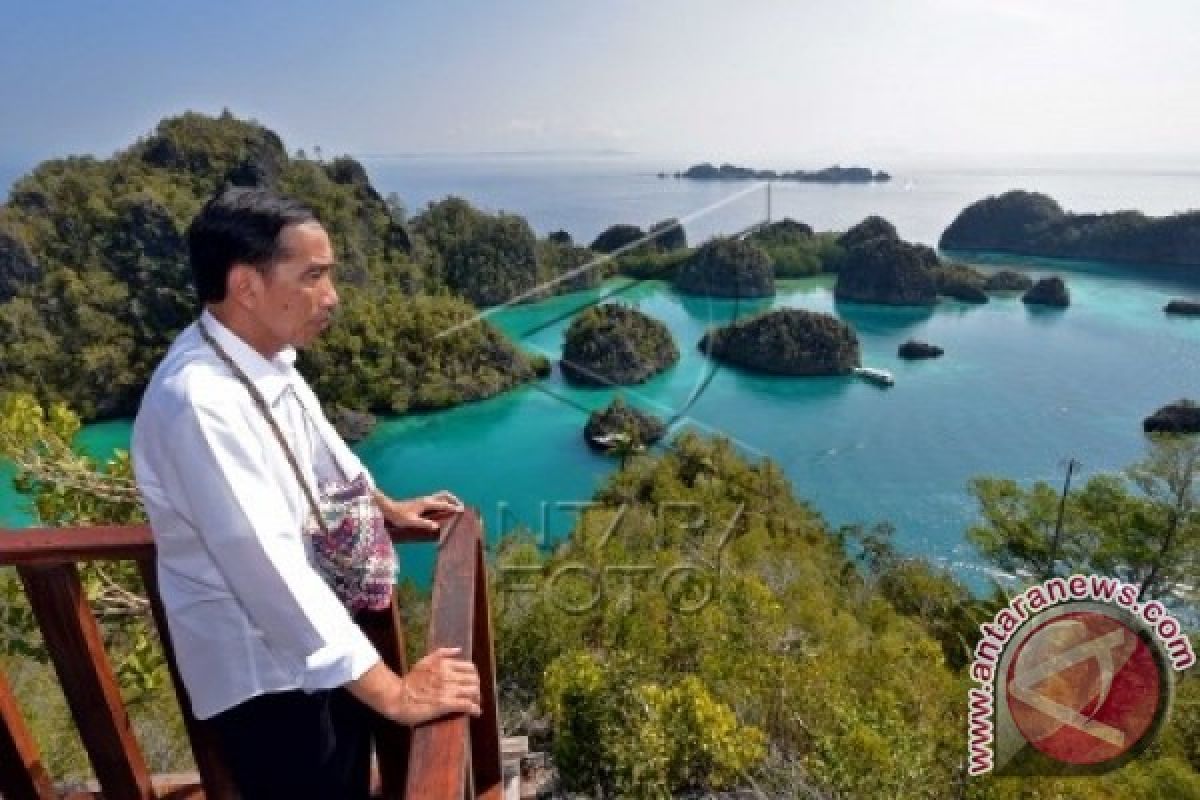
Ilustrasi - Presiden Joko Widodo ketika melihat ke arah kawasan wisata Raja Ampat dalam rangkaian kunjungannya ke Papua Barat. (ANTARA FOTO/HO/Setpres-Agus Suparto/Dok).
Government must also strengthen our diplomacy in international forum to fight the propaganda of Papuan activists and their sympathizer.


